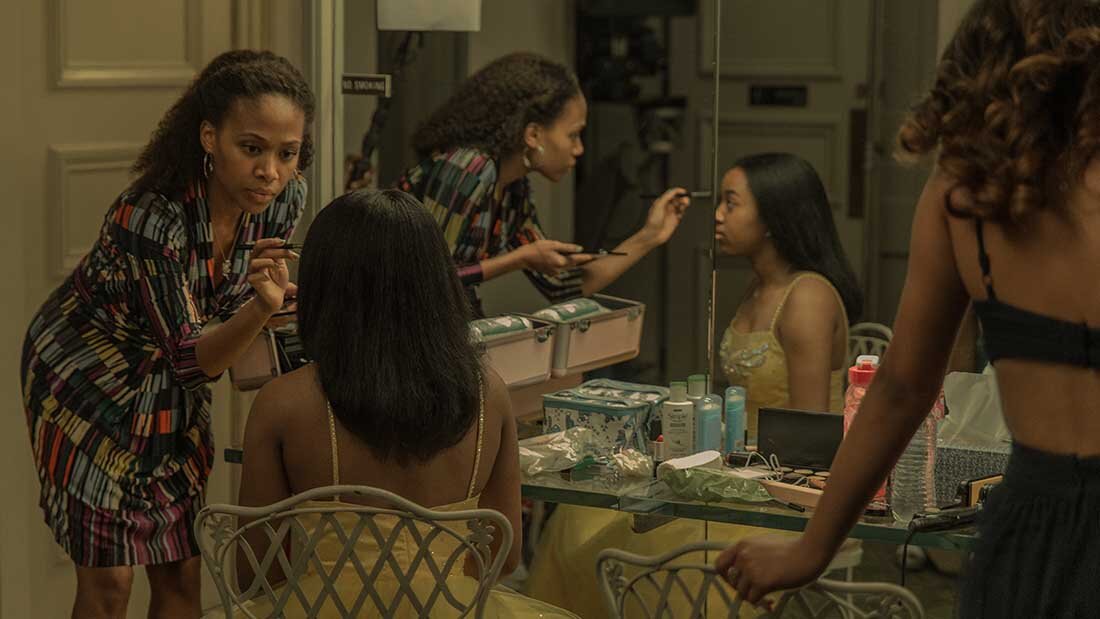By Andrea Thompson
Can a setting and the feelings and experiences it invokes be curated? Can a place and a story not so much leap from the screen as gently surround us while we view it?
I’d make the case for yes after viewing Raven Jackson’s spectacular “All Dirt Roads Taste Of Salt.” As Jackson explores one woman’s life over the decades in rural Mississippi, there’s minimal dialogue and not much more than the bare bones of a story. But the details are so immersive you can almost taste the night air on a quiet summer night, the almost impossibly rich lushness of the soil, and the water that bathes its characters (sometimes literally) as they wind their own way throughout their lives.
A human intruding on such a sensory experience to impose any kind of obvious framing device seems unnecessary to the point of ridiculous, and sure enough, the film rejects narration to the extent that it isn’t until about 35 minutes in until we learn the name of lead Mack, who is mostly played by Charleen McClure. And since the views on framing also extend to linear time, Jackson is clearly counting on her audience to pay close attention to the details she does provide, and appreciate how she lingers on the moments of tenderness she captures.
There’s been plenty of willingness to do so if the reviews are any indication, which have used words like powerful, achingly beautiful, and rapturous. Why not? Even if other filmmakers have expressed a longing for childhood and a world that seems both far simpler and forever lost to us, not since perhaps “Daughters of the Dust” - to cite one of the more obvious influences for “All Dirt Roads” - have sound and imagery fused together to such poetically awe-inspiring ends.
For outsiders, the American South can practically feel like a foreign country in itself. That’s been played up to the heights of epic historical drama, for laughs in films such as “My Cousin Vinny,” and this time it’s worthy of the choice to shoot on 35mm film. Whoever has the privilege of such a viewing, congratulations on being the object of my envy.
“All Dirt Roads” would be remarkable if it was content to be an ode to Black rural life as told through one woman’s experience, but it’s also a loving homage to what we create by handmade means. It’s no accident that one of the first things on-screen is a child’s hands as she’s being instructed by an adult on how to slowly and surely reel in the fish she’s hooked while an equal amount of care is lavished on the sounds of the water swirling and the life that congregates around it.
It’s usually pointless to hope that a cinematographer becomes a household name, but hopefully Jomo Fray defies the odds for his work, and editor Lee Chatametikool is also acknowledged for his skillful transitions, where tiny details like a little girl’s hair ribbons pass as markers for whichever point in time that’s getting a lingering look.
There are a few drawbacks to this approach, even if it’s all art. Such journeys still tend to require some manner of human anchor, and the main pivot becomes the relationship between mother and child, which reveals itself as one of the most potent forces in a film that’s all about the nature of it all. Even when I wish I knew more about what exactly was happening, or maybe just the bare minimum of this movie’s version of exposition, I can only respect a filmmaker who is so skillfully determined to take her time and create a kind of memoir that asks us simply to take our time and consider things.
Hell, “All Dirt Roads” practically begs us to take our time and appreciate our present moments; that there’s plenty of room for modern implements and the old ways of appreciating the natural world. As another film once proclaimed, “An artist is never poor.” The richness of the world in “All Dirt Roads” clearly doesn’t extend to things like bank accounts for any of its characters, but with such faces to do all the talking, and the wealth of music and natural bounty on display, it’s certainly hard to argue.




